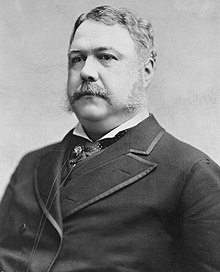

President of the United States
Chester Alan Arthur October 5, 1829 Fairfield, Vermont, U.S.
November 18, 1886(1886-11-18) (57) New York City, New York, U.S.
September 19, 1881 – March 4, 1885
21st president of the United States (1881–85) "Chester Alan Arthur" and "Chester Arthur" redirect here. For his son, see Chester Alan Arthur II. For his grandson, see Gavin Arthur. Chester A. ArthurArthur in 188221st President of the United StatesIn office September 19, 1881 – March 4, 1885Vice President NonePreceded by James A. GarfieldSucceeded by Grover Cleveland20th Vice President of the United StatesIn office March 4, 1881 – September 19, 1881PresidentJames A. GarfieldPreceded by William A. WheelerSucceeded by Thomas A. HendricksChair of the New York Republican PartyIn office September 11, 1879 – October 11, 1881Preceded by John F. SmythSucceeded by B. Platt Carpenter21st Collector of the Port of New YorkIn office December 1, 1871 – July 11, 1878Appointed by Ulysses S. GrantPreceded by Thomas MurphySucceeded by Edwin Atkins MerrittEngineer-in-Chief of the New York MilitiaIn office January 1, 1861 – January 1, 1863Preceded by George F. NesbittSucceeded by Isaac VanderpoelInspector General of the New York MilitiaIn office April 14, 1862 – July 12, 1862Preceded by Marsena R. PatrickSucceeded by Cuyler Van VechtenQuartermaster General of the New York MilitiaIn office July 27, 1862 – January 1, 1863Preceded by Cuyler Van VechtenSucceeded by Sebastian Visscher Talcott Personal detailsBornChester Alan Arthur (1829-10-05 ) October 5, 1829 Fairfield, Vermont, U.S.DiedNovember 18, 1886(1886-11-18) (aged 57) New York City, New York, U.S.Resting placeAlbany Rural Cemetery Menands, New York, U.S.Political partyRepublican (1854–1886)Other political affiliationsWhig (before 1854)Spouse(s)Ellen Herndon (m. 1859 ; died 1880 )Children3, including Chester IIParents William Arthur Malvina Stone Education Union College (BA) State and National Law School OccupationPoliticianlawyerSignatureMilitary serviceBranch/service New York MilitiaYears of service1857–1863Rank Brigadier generalUnitSecond Brigade, New York Militia Staff of Governor Edwin D. MorganBattles/warsAmerican Civil War Chester Alan Arthur (October 5, 1829 – November 18, 1886) was an American lawyer and politician who served as the 21st president of the United States from 1881 to 1885. Previously the 20th vice president, he succeeded to the presidency upon the death of President James A. Garfield in September 1881, two months after Garfield was shot by an assassin. Arthur was born in Fairfield, Vermont, grew up in upstate New York and practiced law in New York City. He served as quartermaster general of the New York Militia during the American Civil War. Following the war, he devoted more time to New York Republican politics and quickly rose in Senator Roscoe Conkling's political organization. President Ulysses S. Grant appointed him to the post of Collector of the Port of New York in 1871, and he was an important supporter of Conkling and the Stalwart faction of the Republican Party. In 1878, President Rutherford B. Hayes fired Arthur as part of a plan to reform the federal patronage system in New York. When U.S Representative James Garfield won the Republican nomination for president in 1880, Arthur was nominated for vice president to balance the successful ticket as an Eastern Stalwart. Four months into his term, an assassin shot Garfield, who died 11 weeks later. Arthur then assumed the presidency. At the outset, Arthur struggled to overcome a negative reputation as a Stalwart and product of Conkling's organization. To the surprise of reformers, he advocated and enforced the Pendleton Civil Service Reform Act. He presided over the rebirth of the US Navy, but he was criticized for failing to alleviate the federal budget surplus which had been accumulating since the end of the Civil War. Arthur vetoed the first version of the 1882 Chinese Exclusion Act, arguing that its twenty-year ban on Chinese immigrants to the United States violated the Burlingame Treaty, but he signed a second version, which included a ten-year ban. Suffering from poor health, Arthur made only a limited effort to secure the Republican Party's nomination in 1884, and he retired at the end of his term. Journalist Alexander McClure wrote, "No man ever entered the Presidency so profoundly and widely distrusted as Chester Alan Arthur, and no one ever retired ... more generally respected, alike by political friend and foe." Arthur's failing health and political temperament combined to make his administration less active than a modern presidency, yet he earned praise among contemporaries for his solid performance in office. The New York World summed up Arthur's presidency at his death in 1886: "No duty was neglected in his administration, and no adventurous project alarmed the nation." Mark Twain wrote of him, "It would be hard indeed to better President Arthur's administration." Despite this, modern historians generally rank Arthur as a mediocre president, as well as the least memorable.

We use cookies
We use cookies and other tracking technologies to improve your browsing experience on our website, to show you personalized content and targeted ads, to analyze our website traffic, and to understand where our visitors are coming from. Privacy Policy.